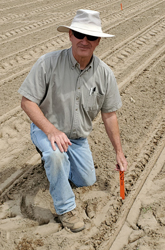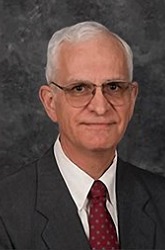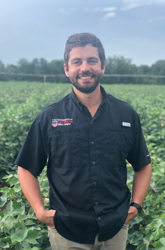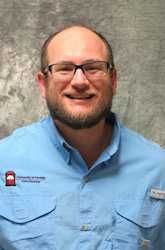 Steve M. Brown is a 1978 graduate in agronomy and soils from Auburn University and later earned MS and PhD degrees in agronomy/weed science at Auburn and Texas A&M, respectively. He worked as an assistant county agent in a cotton pest management role for a couple of years in northern Alabama and then served as a research associate in a Cotton Incorporated-funded project on no-till cotton from 1980 to 1984. From 1987 until 2008, he served as an Extension weed scientist and cotton agronomist for the University of Georgia in Tifton. He worked for a major seed and biotechnology company from 2008 until 2019, when he joined the faculty at Auburn. His entire career has focused on cotton.
Steve M. Brown is a 1978 graduate in agronomy and soils from Auburn University and later earned MS and PhD degrees in agronomy/weed science at Auburn and Texas A&M, respectively. He worked as an assistant county agent in a cotton pest management role for a couple of years in northern Alabama and then served as a research associate in a Cotton Incorporated-funded project on no-till cotton from 1980 to 1984. From 1987 until 2008, he served as an Extension weed scientist and cotton agronomist for the University of Georgia in Tifton. He worked for a major seed and biotechnology company from 2008 until 2019, when he joined the faculty at Auburn. His entire career has focused on cotton.
 Fred Bourland, University of Arkansas, has been involved in cotton breeding since 1970, when he was a graduate student. During his career, he has developed several cotton measurements to describe variation in cotton lines and developed, described, and released nearly 100 cotton lines and cultivars. He has also been directly involved with cotton variety testing since 1978.
Fred Bourland, University of Arkansas, has been involved in cotton breeding since 1970, when he was a graduate student. During his career, he has developed several cotton measurements to describe variation in cotton lines and developed, described, and released nearly 100 cotton lines and cultivars. He has also been directly involved with cotton variety testing since 1978.
 Camp Hand is an assistant professor and Extension cotton specialist at the University of Georgia in Tifton. His research and Extension programs focus on cotton agronomics in Georgia, and his goal is to work with the UGA county agents and growers to answer questions that will help Georgia growers remain sustainable and economical. Camp received his BS and MS degrees at Auburn University in horticulture while minoring in agronomy. His graduate work at Auburn was conducted under Dr. Wheeler Foshee. He then went on to pursue a PhD at the University of Georgia in Tifton in weed science under the direction of Dr. Stanley Culpepper.
Camp Hand is an assistant professor and Extension cotton specialist at the University of Georgia in Tifton. His research and Extension programs focus on cotton agronomics in Georgia, and his goal is to work with the UGA county agents and growers to answer questions that will help Georgia growers remain sustainable and economical. Camp received his BS and MS degrees at Auburn University in horticulture while minoring in agronomy. His graduate work at Auburn was conducted under Dr. Wheeler Foshee. He then went on to pursue a PhD at the University of Georgia in Tifton in weed science under the direction of Dr. Stanley Culpepper.
 John Snider is an associate professor of crop physiology at the University of Georgia; his official appointment is 85% research and 15% teaching. The overarching research objective of the Cotton Physiology Lab is to utilize physiological principles to solve agronomic problems and improve the productivity, efficiency, and sustainability of cotton production in Georgia. Snider is particularly focused on characterizing physiological response to yield-limiting stresses, identifying management strategies that improve water use efficiency, and identifying traits associated with improvements in seedling vigor.
John Snider is an associate professor of crop physiology at the University of Georgia; his official appointment is 85% research and 15% teaching. The overarching research objective of the Cotton Physiology Lab is to utilize physiological principles to solve agronomic problems and improve the productivity, efficiency, and sustainability of cotton production in Georgia. Snider is particularly focused on characterizing physiological response to yield-limiting stresses, identifying management strategies that improve water use efficiency, and identifying traits associated with improvements in seedling vigor.
 Lori Unruh Snyder has extensive international experience encompassing working with the business sectors with corporate social responsibility, workforce development, project management, public engagement, and grant services. She received three grants from the 100,000 Strong in the Americas Innovation Grant Program created by President Obama. She was the faculty ambassador for the program and representative to meet Ambassadors for Brazil, Colombia, Costa Rica and Peru. She has proven representation and publication skills and was selected to present her outreach and success of her program to Vice President Biden in 2015 at the White House. She is skilled in Strategic Planning, Innovation, Institutional Funding, Sustainability, Agriculture. She is native Delawarean and grew up on a dairy farm where her passion for agriculture and conservation grew out of her family farm experiences. She is an Associate Professor at NC State where her main responsibilities are teaching, research and global engagement for the undergraduate students for four programs within the Crop & Soil Science Department. Her appointment is predominately teaching with research within international agriculture. In 2012, she was awarded the regional teaching award for North American Teachers of Agriculture. In 2009, she was awarded the International Education Award for New Faculty while at Purdue University and the USDA New Teacher Award from the APLU. She is the innovator behind the CROPVIEW repository and the Feast or Famine simulation, which educates the youth about food security game.
Lori Unruh Snyder has extensive international experience encompassing working with the business sectors with corporate social responsibility, workforce development, project management, public engagement, and grant services. She received three grants from the 100,000 Strong in the Americas Innovation Grant Program created by President Obama. She was the faculty ambassador for the program and representative to meet Ambassadors for Brazil, Colombia, Costa Rica and Peru. She has proven representation and publication skills and was selected to present her outreach and success of her program to Vice President Biden in 2015 at the White House. She is skilled in Strategic Planning, Innovation, Institutional Funding, Sustainability, Agriculture. She is native Delawarean and grew up on a dairy farm where her passion for agriculture and conservation grew out of her family farm experiences. She is an Associate Professor at NC State where her main responsibilities are teaching, research and global engagement for the undergraduate students for four programs within the Crop & Soil Science Department. Her appointment is predominately teaching with research within international agriculture. In 2012, she was awarded the regional teaching award for North American Teachers of Agriculture. In 2009, she was awarded the International Education Award for New Faculty while at Purdue University and the USDA New Teacher Award from the APLU. She is the innovator behind the CROPVIEW repository and the Feast or Famine simulation, which educates the youth about food security game.
